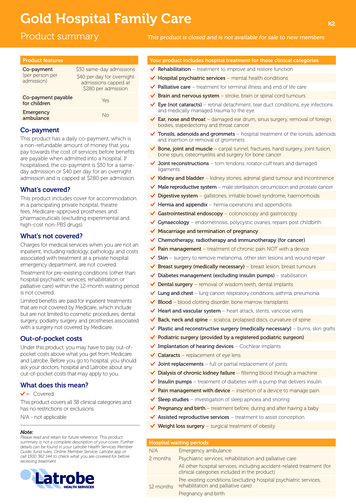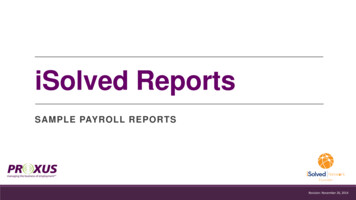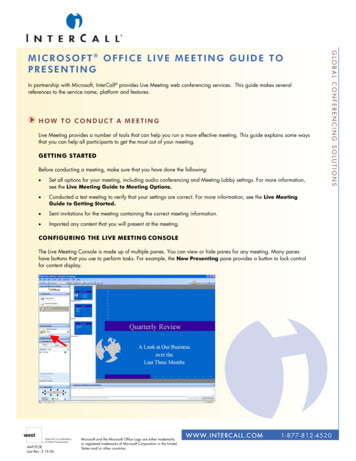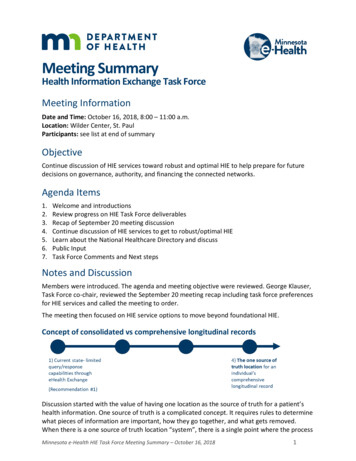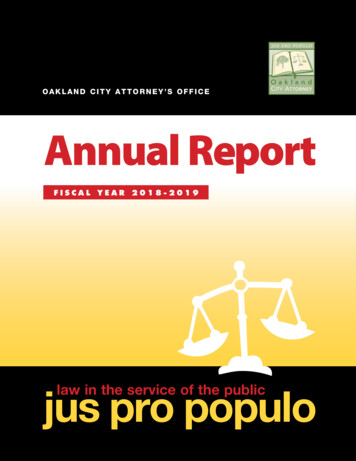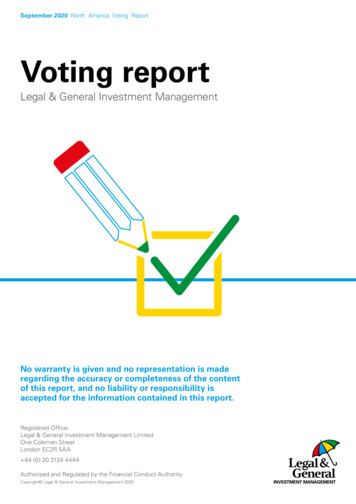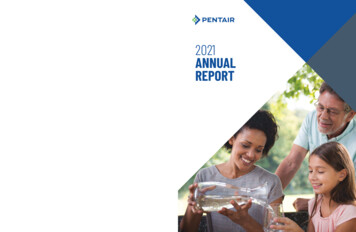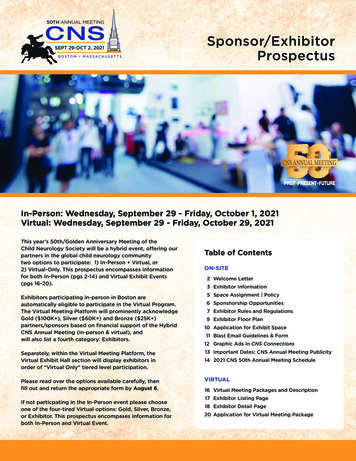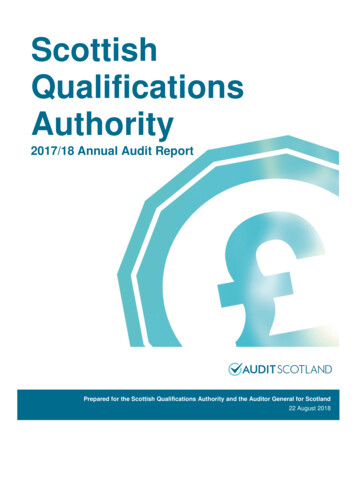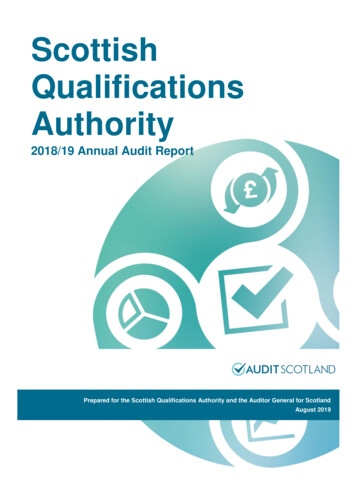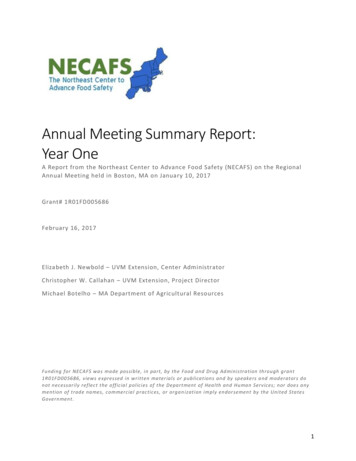
Transcription
Annual Meeting Summary Report:Year OneA Report from the Northeast Center to Advance Food Safety (NECAFS) on the RegionalAnnual Meeting held in Boston, MA on January 10, 2017Grant# 1R01FD005686February 16, 2017Elizabeth J. Newbold – UVM Extension, Center AdministratorChristopher W. Callahan – UVM Extension, Project DirectorMichael Botelho – MA Department of Agricultural ResourcesFunding for NECAFS was made possible, in part, by the Food and Drug Administration through grant1R01FD005686, views expressed in written materials or publications and by speakers and moderators donot necessarily reflect the official policies of the Department of Health and Human Services; nor does anymention of trade names, commercial practices, or organ ization imply endorsement by the United StatesGovernment.1
SummaryA key goal of the Northeast Center to Advance Food Safety (NECAFS) is to foster multi-state, multidisciplinary and multi-role collaboration to improve educational and performance outcomes amongregional stakeholders. To this end, NECAFS joined with the Northeast Association of State Departmentsof Agriculture (NEASDA) to hold an inaugural annual meeting in Boston, MA on January 10, 2017. Thismeeting brought 57 state, regional and national partners together for a focused, one-day discussion onthe implementation of the Food Safety Modernization Act (FSMA) in the Northeast Region of the US.For many, this was the first time state regulatory authorities and traditional state educational programleads met for such a discussion.Meeting OutcomesThe main outcomes of the meeting included: Fifty-seven (57) people working on the same topic around the region met in-person and activelyengaged in meaningful dialogue on shared or complementary work.A sharing culture and dynamic was initiated in which state regulatory, educational and industryorganizations described their intended activities and identified opportunities for interagency,interstate and transdisciplinary coordination and collaboration.Regional partners articulated areas of need where integrative organizations such as NECAFS andNEASDA can provide support and value. These emerging themes, concerns and questions aresummarized below, along with some initial or potential plans to address them.Emerging Themes, Concerns Voiced and Questions RaisedRegulatory TopicsPlanned or Potential ActionOutstanding questions surrounding farminventory; level of detail, privacy, integration.NASDA and FDA are addressing.Concerns over conflicts of interest (auditors /inspectors providing tech support/precompliance review at the same time).Share planned and potential working modelsperhaps via the On Farm Readiness Reviewprocess.Concerns about varying state programs limitinggrowers market access across state borders(hope that there is consistency or at least comityacross state programs).NASDA model law development and sharingamong states of planned / proposed statutes andother implementation details.Farmers and food businesses that are exempt –concern that there will be a decline in local foodsince buyers are going to start demanding thatgrowers be “FSMA compliant”, i.e. marketdemand vs. regulatory requirement.Work toward equal access to resources (e.g.training, capital, technical support) for all farmsand businesses whether covered by the rules ornot.2
Concerns that guidance from the FDA will not beavailable in time for implementation dates.Important for states to coordinate, plan and takeadvantage of available financial resources.Add-on and supplemental materials may help tobridge the gap. The risk is that guidance mightdeviate from these materials.Share planned and potential working modelsperhaps via NECAFS webinar series.Educational and Research TopicsPlanned or Potential ActionConcerns that extension will not have thecapacity to provide the level of technicalassistance needed.Improve regional collaboration and coordinationthrough NECAFS to better articulate state levelwork and needs and to better support sharing ofresources and fund-raising for necessaryadditional resources.Increase number of lead instructors in both PSand PC to ensure wide availability of courses.NECAFS’ TSSP can support this financially, needimproved coordination with National Alliances(PSA and FSPCA).Need a clearinghouse for resources, people andprojects to better understand the landscape andactivity in the region. This is a near-term goal ofthe NECAFS website development effort.Getting enough people trained, and trainedproperly, that will be responsible for helpinggrowers meeting implementation requirements.There is great work going on across the region:but there seems to be duplication andredundancy. Can we find a way to host a list ofongoing regional work or otherwise improvecoordination and collaboration?Joint and Crosscutting TopicsPlanned or Potential ActionDo Extension and Departments of Ag understandeach other’s roles? There should be moreopportunities to allow for open communicationbetween these groups.Plan to use NECAFS monthly webinar series andfuture meetings as an opportunity to improvethis understanding.Is there any opportunity to provide financialsupport for the grower? There is a long way thatgrowers need to go to adopt food safety.There is a great opportunity to pursue increasedfunding in support of capital improvements withfood safety benefit. A regional, multi-stateproposal should be drafted specifically for thispurpose. A revolving loan fund could also beestablished, although there is resistance toadditional debt to cover food safetyimprovement costs when there is no likely priceincrease to support it.3
Meeting DiscussionNational UpdateDoreen Gubbay and Abe Brown from The Food and Drug Administration (FDA) Office of RegulatoryAffairs (ORA) reported that State and Territory Cooperative Agreements have been awarded to enhanceproduce safety in preparation of implementation of FDAs rule.Presentation discussed: Information Technology / Farm InventoryStrategic PlanningProgrammatic administrative project office contract informationNational Association of State Departments of Agriculture’s (NASDA) role in assisting with thestate produce safety cooperative agreementsProposed NASDA plan for coordination and sharing of work between statesFoodShield overviewFull presentation found hereRegional UpdateArt Johnstone from the National Association of State Departments of Agriculture reported that theirgoal is to promote partnerships between ag agencies, health agencies and extension groups.They will strive to assist states in building a uniform structure that meets each individual state’s needs.For example: they will be responsible for figuring out some of the nuts and bolts of the cooperativeagreement requirements (e.g. how to do financial reporting) and then will disseminate that informationto the states.Farm inventory: NASDA is thinking about a strategy for collection. Current version includes collection ofsignificant amounts of information however, NASDA doesn’t expect states to collect ALL thatinformation. They see the list as exhaustive and state’s will start with a few pieces and build outovertime if needed.On farm readiness: pre-audit walk-throughs will be offered in 6 states to pilot and refine the processbefore opening up for all states in 2018. State regulators and extension agents will work collaborativelywith this pre-compliance, on-farm face-to-face process of walking through components necessary forcompliance w/ Produce Safety Rule. This is envisioned as Phase 1 followed by further technicalassistance provided to growers by states (which will be developed by the individual states). There is anon farm readiness tool kit currently being developed to be made available as a resource to states.State UpdatesIn 2016, states were awarded cooperative agreements to support the regulatory implementation ofFSMA through the FDA ORA’s Cooperative Agreement Program (CAP). These cooperative agreementshelp to outline and implement regulatory educational programs and support inspections. States couldapply for Competition A only or Competition A/B. More background: State Produce ImplementationCooperative Agreement Program.Competition A – education and outreach program4
Competition B – inspectional support of the competition A programThese awarded programs integrate with training and educational programming underway at academicinstitutions and with private sector partners in ways that are unique to each state as noted.ConnecticutUpdates on Regulatory FrameworksUpdates on Education and ResearchUSDA GAP audit program started in 2007 butOn average, 2 GAPs workshops per year. Hasstopped once comp grant was awarded. Waitingdeveloped a post-harvest packing house trainingto find out exactly what FDA is looking for inthat went into a more detailed workshopinspection process. Hoping FDA will providecovering packing house sanitation, has farmerstemplates soon. Strategic plan is currently inbuilding new packing houses and sharing details,development. Currently working with otherGMPs, etc. Conducts farm visits and providesagencies on a farm inventory. Partnership withassistance writing food safety plans. Hosts PSAExtension.trainings. Hired a farmer to be on GAPs trainingteam. Will offer Preventive Controls course inApril; assisted URI last Nov and assisting UMASSin Jan 2017. Also teaches home foodpreservation.DelawareUpdates on Regulatory FrameworksUpdates on Education and ResearchNo regulatory representative present for thisUDE has a small team doing various GIP/GAPmeeting.trainings and advanced produce safety trainingfor growers regarding the behind the scenes offoodborne illness outbreaks. Collaboratenationally looking at irrigation water standards.Working to grow watermelons in the presence ofraw poultry manure to follow pathogens fromapplication to soil to detection on watermelon.Conducting quantitative risk analysis for FDA.Trying to branch out to other regions to collectdata for this project. Involved with CONCERN(nexus of water, food and health) to look at nontraditional ag water sources to establishparameters for water.MaineUpdates on Regulatory FrameworksUpdates on Education and ResearchNo regulatory representative present for thisProcess authority work. Will be offering PC formeeting.Human Food, Produce Safety, HACCP, andGeneral Sanitation. Working with restaurantswith regard to FSMA and the growers that theybuy from. Conducting assessment to determinethe needs of farmers, food businesses andprocessing industry. Dedicated people workingin produce safety, preventive controls, andmicrobiology.MarylandUpdates on Regulatory FrameworksUpdates on Education and Research5
MD has developed their own GAP certificateprogram with follow-up inspections. MD hostsbuyer/grower meetings to discuss food safety,what are growers doing, what do buyers need,etc. Also, meet individually with buyers. MD &MA gave joint presentation. See full presentationhereHave been conducting GAP trainings and mockaudits for years. Will be focusing on PreventiveControls. Hosting 4-day trainings that targetsgrowers with value added processing (day 1 Produce Safety Rule and days 2-4 PreventiveControls.) Offering fruit and veg technologycourse, wine making, beer making and foodsafety. Students learn about food safety andtechnology. Would love to collaborate with otherUniversities.MassachusettsUpdates on Regulatory FrameworksUpdates on Education and ResearchMA has developed their own GAP certificateResearch to iron out challenges MA growers haveprogram. USDA GAP program was not beingexperienced. Also works with food processorsapplied uniformly, which was a driving force forand growers who want to expand into valuethe development of MA program. Also, thereadded products. Work to assist constituents inwas a need for technical assistance which wasachieving regulatory compliance. Currentlynot provided via USDA GAP. MD & MA gave joint teaching: Better Process Control School; Producepresentation. See full presentation hereSafety Education; various technical workshopsincluding product development.New HampshireUpdates on Regulatory FrameworksUpdates on Education and ResearchHiring a produce safety grant coordinator.Development of an on-line food safety toolbox.Working with UNH to do primary education andConducted a survey in NH and a few focus groupoutreach efforts.interviews to gather information for topics andformats for toolbox and website (New EnglandConsortium for Food Entrepreneurs). Thiswebsite is currently being updated. Onerepresentative from each state will have fullaccess to website to make state-specific changes.New JerseyUpdates on Regulatory FrameworksUpdates on Education and ResearchEstimates that there are 526 NJ farms that willHeld 6 PSA trainings and 1 Train the Trainer infall under FSMA. Looking to hire an inspector.2016. Conducting on-farm mock audits pergrower requests. Developing materials andvideos to use for education.New YorkUpdates on Regulatory FrameworksUpdates on Education and Research6
Have completed GAP audits for many years.Have decided not to have GAP auditors involvedwith FSMA inspections given conflict of interest.Office Administrator hired to handle producesafety. Will soon meet with collaborators: statefarm bureau, food industry alliance, growerassociations, etc. It will be a challenge to identifyfarms in the state covered by FSMA. Have held aPSA training.Hosts several GAPS trainings. Conducted a longterm evaluation of the 2 day GAPs program,including cost of implementing farm food safetypractices. Hosts postharvest wash waterworkshops. New: research program looking atwater analysis water methods, lab validationmethods: sensitivity, accuracy, and precision, andbroccoli project: sanitation protocols.PennsylvaniaUpdates on Regulatory FrameworksUpdates on Education and ResearchNo regulatory representative present for thisDeveloped a mushroom GAP course which wasmeeting.picked up by USDA. Integrative research lookingat Listeria monocytogenes (Lm) in mushroomgrowing and processing facilities. Looking atvalidating thermal processes for sanitation ofmushroom slicer. Looking at Lm in apple packingfacilities on non-food-contact surfaces. Will becollaborating with Washington State to look atsanitation in apple packing houses. Food safetyoutreach program to work with Amish andMennonite constituents. Offers GAPs andpreventive controls workshops.Rhode IslandUpdates on Regulatory FrameworksUpdates on Education and ResearchURI, RI Department of Health, and RI Dept. Ag all URI is maintaining the RI GAP program withworking collaboratively. Hired a Produce Granteducation and assistance. URI works closely withManager. Gathering farm inventory data, inRI Department of Health on numerous programscollaboration with URI & Dept. Ag. Developing ato provide outreach education in line withstrategic plan.regulatory compliance, as well as development ofguidance documents. Providing support toincubator kitchens. Collaborative efforts with NEcolleagues on numerous project including a NEneeds assessment (300 grower respondents).Knowledge base from survey showed highknowledge of food safety principles for growersof medium and small size in region.West VirginiaUpdates on Regulatory FrameworksUpdates on Education and ResearchWorking on an integrative approach withWater quality is an issue due to agingextension to create food safety training team, toinfrastructure; not a lot of farm land left; trying toinclude: Extension, Dept. Health and Dept. Ag.approach food safety w/ a risk managementDept. Ag will serve as liaison for food safetyperspective. Looking at options, cost and impacttraining team to take responsibility for trainingof FSMA and associated rules. Have hired aand technical assistance offered to farmers.consultant to assist with food safety planCurrent issues include: multiple funding sources,7
limited regulatory staff, providing technicaldevelopment. Hosting a train the trainer PSAassistance and hiring additional staff. Havecourse in 2017.decided not to have GAP auditors involved withFSMA inspections given conflict of interest.VermontUpdates on Regulatory FrameworksUpdates on Education and ResearchHired a program coordinator for produce safety.UVM research with approach from a farmerHiring 4 people to assist with FSMA work:perspective to understand how they perceivecommunication, outreach and technical, IT, andagricultural issues and what motivates them tolegal services regarding compliance. Looking toimplement food safety practices. Emphasis ofhire some inspection staff. See full presentationproject is to increase grower food safetyhereknowledge and design support for adopting scaleappropriate food safety practices that will reduceoverall risk of foodborne illness and increaseaccess to local and regional markets. UVMextension looking into produce tracking systemsto aid in record keeping. Involved withmanufacturers to designed equipment that ismore aligned with food safety standards.Other Updates---The Produce Safety Alliance (PSA) came into existence in 2010 and launched the official FSMAcurriculum training program in 2016. In the fall and winter of 2016 they conducted 20 train thetrainer courses (training 622 people) and 23 grower training courses nationally (training 489growers). All is going well because of collaboration.Northeast Organic Farming Association of New York (NOFA-NY) will be coordinating PSAtraining, technical assistance, buyer training, wash water sanitation, and pack shed practices.Looking at overlap of FSMA/MLP/GAP. Working with NOFA-VT to get inspectors up to speed.Will be hosting annual meeting for all FSOP grantees this spring.National Farmers Union (NFU) and NE Farmers Union (NEFU)o NFU is conducting a needs assessment, to be followed-up with a listening session tovalidate and verify needs assessment data. Trying to offer low cost trainings for producegrowers.o NEFU upon guidance from FDA will generate FSMA compliance tools for farmers. Goal isto reduce burden on farmers and minimize the duplication of efforts.8
Attendee Evaluation SummaryAttendees reported that they learned more about the details of cooperative agreements and that eachstate’s approach to execution of those grants is very different, as well as awareness of some specifics ofthose different approaches. Especially an increased knowledge of farm inventory work. Similarly, theygained understanding of expectations of responsibilities during implementation and realized the amountof intricacies of multi-agency collaboration and communication. Attendees reported to have a broaderunderstanding of the role of non-state, non-university stakeholder groups, such as NECAFS, NASDA andNEASDA and emphasized their plans to engage in more collaboration going forward.Attendees gained a better understanding of regulatory confusion and thought the interactions withdifferent stakeholders put into context the barriers to implementing FSMA. It was very helpful to havemost of the players around the same table.They described an increased knowledge of regional projects (research, education and regulation) andsaid the discussion facilitated ideas for improved work products and training. Discussion seemed tofocus a lot on produce safety but not much discussion of preventive controls.Attendees have a better awareness of the many efforts and information generation across the regionand plan to exchange ideas and make connections in order to be helpful, and to be helped, in achievingcommon goals.The most commonly voiced food safety challenge seen in the region is reaching and engaging thequalified exempt farmers. Similarly, reaching small food business and processors is seen as a challenge.There is a need for informational resources from the FDA and for future research to address outstandingcompliance questions. Without more information, attendees voiced concern about overcoming thesechallenges.9
AttendeesLast NameFirst NameOrganization / AffiliationBaldwinDeannaMaryland Department of AgricultureBeaulieuJustineUniversity of MarylandBernazzaniDianeMA Department of Public Health - Food Protection ProgramBihnElizabethCornell University / PSA / NECAFS Co-PIBoltonJasonUMaineBotelhoMichaelMassachusetts Department of Agricultural ResourcesBrownAbeU.S. Food and Drug AdministrationBryantHeatherUNH Cooperative ExtensionCallahanChrisUVM Extension / NECAFS DirectorCantelmoAndreHeron Pond FarmCarnevaleLucaHope & MainConcraKimberlyBarnstable County/Cape Cod Cooperative elliAngela MarieUniversity of MarylandFinleyAaronNew York State Department of Agriculture & MarketsGreeneFrankState of ConnecticutGubbayDoreenFDAHirschDianeUniversity of ConnecticutJohnstoneArtNational Association of State Departments of AgriculturelKasacekWayneConnecticut Department of AgricultureKinchlaAmandaUMass Amherst / NECAFS Co-PIKleinguentherChristianNew Jersey Department of AgricultureKlineWesRutges Cooperative ExtensionKnielKaliUniversity of DelawareKuehneSumnerState of Vermont, Agency of Agriculture, Food & MarketsLaBordeLukePenn State University / NECAFS Co-PILukerJohnNew York State Department of Agriculture & MarketsMachadoRobsonUniversity of MaineMartelCynthiaWest Virginia Department of AgricultureMatzenChelseaNational Farmers UnionMaulLauraMassachusetts Department of Agricultural ResourcesMcCormickSeanRhode Island Department of HealthMcKeagLisaUMass ExtensionMehlenbacherShelleyVermont Agency of Agriculture, Food, and MarketsMellionElizaSimmons CollegeMooreJamieEat’n Park Hospitality GroupNevesPriscillaFDA ORA Office of PartnershipsNewboldElizabethUVM Extension / NECAFS10
Last NameFirst NameOrganization / AffiliationNoonanRogerNew England Farmers UnionOehlkeBonitaMA Department of Ag ResourcesParkerJasonUniversity of VermontPerryJenniferUniversity of MainePivarnikLoriUniversity of Rhode IslandReadDavidInternational Food Protection Training Institute (NCC)RichardNicoleUniversity of Rhode IslandRossCharlesUniversity of VermontSchirmerSteveNew York State Department of Agriculture & MarketsShermanBruceConnecticut Department of AgricultureSmithColleenState of New HampshireSweetKristinaVermont Agency of Agriculture, Food & MarketsUtterAlishaUniversity of VermontVioletteCatherineUNH Cooperative ExtensionWalshChristopherUniversity of Maryland / NECAFS Co-PIWentworthJasonMassachusetts Department of Agricultural ResourcesWhiteCatherineRIDOHWilkinsBruce G.Agrinetix, LLCWillardAbbeyVermont Agency of Agriculture, Food and Markets11
About NECAFSTHE PROJECT: As one of four regional centers (RC’s) funded either by the FDA or USDA NIFA, theNortheast Center to Advance Food Safety (NECAFS) is consolidating and coordinating food safetyeducation efforts in a collaborative and consistent manner. The long-term goal of NECAFS (as a center)is to provide a sustainable, comprehensive food safety training, education and technical assistanceprogram that assists small and mid-sized food producers and processors with FSMA compliance. Ouroverall objective (as a project) is to build the regional network infrastructure necessary to support anational food safety system that increases the understanding and adoption of established food safetystandards, evidence-based guidance, and protocols for those affected by FSMA rules and other foodsafety regulations and market requirements. Our target audience includes owners and operators ofsmall and medium-sized produce farms, beginning farmers, socially disadvantaged farmers, smallprocessors, and small fresh fruit and vegetable merchant wholesalers in the Northeast region. Theproject team is led by a collaborative group of co-investigators who provide disciplinary (produce,process and infrastructure) and geographic diversity. The project is achieving these goals through thepursuit of the following objectives:1. Establish Foundational Structure – Capture the Development and Implementation components ofthe project including Early-Stage Center Structure, Outreach, Recruitment and Training Plan, CenterStrategic Plan Development & Development of a Communication Plan.2. Build Capacity, Competency and Collaboration – Recruit and develop the regional “network” byleveraging the collective expertise of University partners and FDA to provide comprehensiveinformation and educational events on topics related to FSMA regulations.3. Develop Curricula and Deliver Educational Programs – Connect regulatory development andcompliance requirements with science-based research and educational programs throughcooperative activities between NECAFS partners, FDA, and Northeast state departments ofagriculture.4. Evaluate and Assess Progress and Impact – Make a Positive Impact: To Participants, To Trainers, &To Science. We will ensure this by implementing an overall evaluation plan.5. Sustain Good Work – Prioritize achieving sustainability and will use the developed networkstructure to seek future external funds in support of collaborative educational programs andresearch initiatives.NECAFS aims to improve food safety in the Northeast through the collaborative development ofoutreach and education efforts. Specifically, NECAFS will: collaborate to provide comprehensiveinformation and educational events on topics related to FSMA regulations; educate our target audience,connecting regulatory development and compliance requirements with research and educationalprograms; we will aggregate information (i.e., one-stop shopping) for all stakeholders; and we willinnovate, working collectively with stakeholders to prioritize issues, and facilitate research to addressthese issues in the Northeast U.S.More information:Website: http://go.uvm.edu/necafsEmail: necafs@uvm.edu12
On farm readiness: pre-audit walk-throughs will be offered in 6 states to pilot and refine the process before opening up for all states in 2018. State regulators and extension agents will work collaboratively with this pre-compliance, on-farm face-to-face process of walking through components necessary for compliance w/ Produce Safety Rule.
